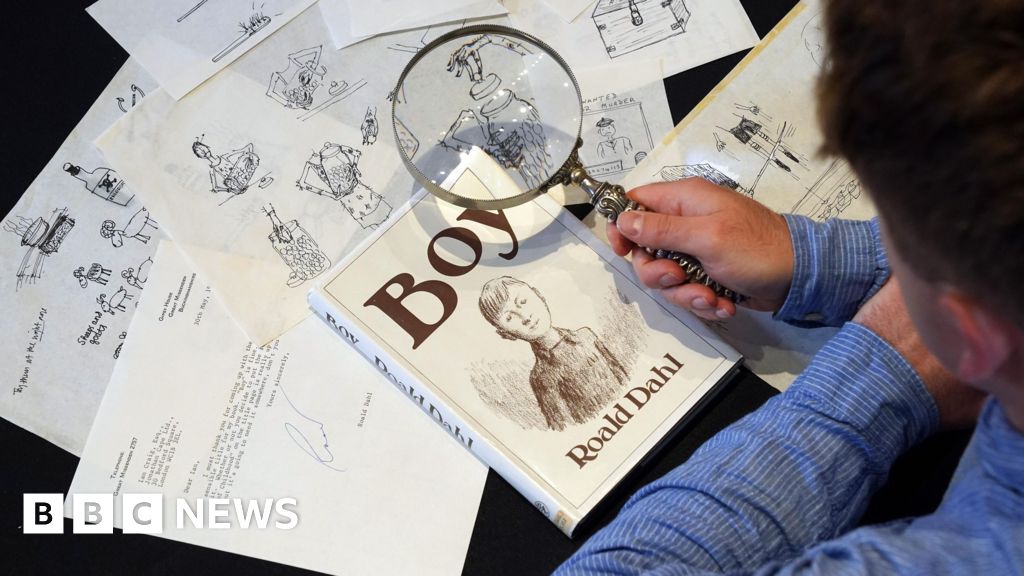ARTICLE AD BOX
 Image source, Edwin Flay
Image source, Edwin Flay
Edwin Flay said it was difficult to write about his grandmother's death
A large gentle man with a dark suit, big bushy beard and a bowl of sweets on his desk.
That is all Edwin Flay remembers about Harold Shipman during visits to his surgery as a child in the 1970s - before the GP killed the boy's grandmother.
Now he is taking on the challenge of portraying the mass murderer in a play he wrote.
The Quality of Mercy is set in prison the night before Shipman's suicide.
Mr Flay was born in Devon but moved to Shipman's hunting ground of Hyde for five years when he was three.
It was there that he first came into contact with the GP, who became one of the UK's most prolific serial killers.
Mr Flay, who is performing the play at Edinburgh Festival Fringe, said: "I was only four years old but I remember a large gentle man with a big bushy beard who had a bowl of sweets on his desk for a good child who didn't make a fuss during a check up, and that's pretty much all of my memory of him.
"It's a perfect illustration of why he was able to operate for so long as he was. He had an excellent bedside manner, he was very good at making people feel comfortable."
Harold Shipman killed himself in prison in 2004
Shipman killed at least 215 of his patients, including Mr Fly's grandma, Renee Lacey. She was murdered in 1996 aged 63.
He said: "My grandmother, when she passed away, was extremely ill. She had two kinds of cancer and an as yet undiagnosed form of dementia and when she died, my mother and I were not entirely surprised. It was a little bit sudden."
After later learning of the extent of Shipman's chilling crimes, Mr Flay, who was a political journalist and researcher at the BBC for more than 20 years, decided to write a play about the killer in 2019.
"I didn't realise the sheer number of people he had killed, and how many of them were perfectly healthy at the time," he said.
"So I initially started very naively with the idea of writing a more nuanced take on the man and then within two weeks I binned all my notes. When I read about just the sheer extent of what he had done.
"I was talking to someone a few months later about this idea that I'd had and she'd said, 'Oh, yes. He helped a few old dears over the threshold, didn't he?'
"And I had to say no, he killed two hundred and eighteen people. Many of whom were perfectly healthy.
"And I realised that the society was starting to lose sight of the full extent of what he'd done. And so I went from wanting to do a more nuanced, possibly more sympathetic examination of him, to going completely the other way and wanting to lay bare, in a show, the full extent of what he'd done."
Image source, Edwin Flay
Image caption,Edwin Flay as Harold Shipman at Edinburgh Fringe Festival.
In writing the production, the playwright drew on the four-year public inquiry into Shipman's murders, which produced its final report in 2005. It took evidence from four criminal psychologists, and considered witness statements from victims' relatives - including Mr Flay's mother, grandfather and aunt.
He added: "In terms of actually playing him, my director, Bernie C Byrnes, who has been invaluable to me in this process, reminded me that he was a narcissistic psychopath. That he always had to be the hero of his story.
"When I'm playing him, as an actor, I'm only trying to feel what he's feeling so the impact of my personal connection, it came out in rehearsals.
"I would find that the scene with my grandmother was the hardest to learn and it wasn't any more complexly written than anything else but I was finding very much an emotional block to doing it.
"The hardest parts to play are actually the scenes from the start of his life when he was watching his own mother dying, rather than enacting the death of my own grandmother because I am playing him. It's his emotional journey."
The Quality of Mercy is described as a "psychological study" of Shipman and is set in his prison cell the night before he killed himself.
The inquiry into Shipman's killings heard the GP had become "addicted to death", something the writer says he drew on in his play.
He said: "That sense of power that gave him the ability to choose to take people's lives on a whim. That struck me as very plausible.
"Certainly the hypothesis in the play is that maybe it did start from a perspective of mercy - hence the title, The Quality of Mercy - that perhaps for the first few victims, it came from a place of wanting to ease suffering.
"But it very rapidly became his need to exert control over everyone he encountered."
Mr Flay said the play was well received by his family.
"I have also had some relatives of Shipman's victims coming to see the show and the response has been overwhelmingly positive," he said.
"No one has come to me angry afterwards. In fact. a lot of them have said how moving it was to see their relatives' names projected onto the wall as the play goes on and some of them have said it has given them a degree of closure, which is more than I could ever have hoped for."
The Quality of Mercy finishes on Saturday 26 August.
Why not follow BBC North West on Facebook, Twitter and Instagram? You can also send story ideas to northwest.newsonline@bbc.co.uk
Related Internet Links
The BBC is not responsible for the content of external sites.

 1 year ago
68
1 year ago
68








 English (US) ·
English (US) ·